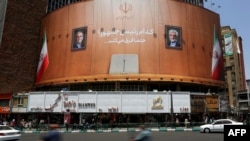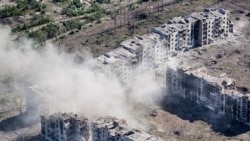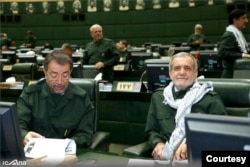As Iran stages a presidential election runoff on Friday, its critics say the West should not interpret uncertainty about the likely victor as an indication of a democratic contest between two competing loyalists of the Islamic republic’s supreme leader.
Friday’s vote pits ultraconservative former Iranian nuclear negotiator Saeed Jalili against the relatively moderate former Health Minister Masoud Pezeshkian. Official results from the June 28 first-round vote gave Pezeshkian 44% of the vote, four points ahead of Jalili, with two other ultraconservatives lagging behind. The inability of any candidate to clinch at least 50% of the vote triggered the runoff between the top two performers.
Most of the Iranian electorate boycotted the first round, with the government reporting an official turnout of 40%.
The U.S. says the Islamic republic’s elections are neither free nor fair because its ruling system disqualifies candidates deemed not sufficiently loyal to Supreme Leader Ayatollah Ali Khamenei. The Iranian government also has a record of inflating turnout figures to boost its domestic legitimacy, according to independent research and advocacy groups such as U.S.-based United Against Nuclear Iran.
UANI’s director of research on Iran’s Islamic Revolutionary Guard Corps, Kasra Aarabi, co-authored a June 25 report asserting that a shadowy IRGC branch called the Baqiatallah Headquarters has been a leading force in rigging Iranian presidential and parliamentary elections. The report cited what it called primary Persian sources, including official IRGC material, presentations and recordings obtained from government offices.
In a statement to VOA, Iran's U.N. Mission in New York reacted to the UANI report by saying the Guardian Council, an Iranian body stacked with Khamenei loyalists who vet presidential candidates, is responsible for verifying the accuracy of elections and addressing complaints.
"Regarding the first round of the presidential election, the Guardian Council has confirmed the validity of the outcome,” the statement said.
Aarabi discussed the potential of a manipulated vote and weak turnout for the presidential runoff election on Thursday’s edition of VOA’s Flashpoint Global Crises program.
The following interview transcript has been edited for brevity and clarity.
VOA: Will we see the same kind of record low turnout that we saw in the election's first round?
Kasra Aarabi, United Against Nuclear Iran: We can expect this to happen again in the second round. Despite Khamenei trying hard to increase political participation and revive the manufactured, hard-liner-reformist dichotomy between Jalili and Pezeshkian, Iranians are not buying it. They no longer believe the Islamic republic can be reformed. They believe that Jalili and Pezeshkian are two sides of the same coin.
In spite of the low participation numbers, Khamenei has been relatively successful in creating the illusion of false competition inside the country for an external audience. If you look at Western media coverage of the election, he has been able to manufacture a bit of a buzz for this election. Although Iranians have not fallen into Khamenei’s trap, at least some of the outside world has. So on that count, he will be partially satisfied.
VOA: Given that relative moderate Pezeshkian got a bit more votes than ultraconservative Jalili in the first round, and we do not know how voters who picked the other two ultraconservative candidates may vote in the runoff, what does this uncertainty signify about the election?
Aarabi: When we consider the idea that Pezeshkian is a reformist who presents what some might call a golden opportunity for change, let's be real.
Power in Iran is completely centralized in the hands of the supreme leader, his office — the Beit-e Rahbari — and the IRGC.
And who is Pezeshkian? He endorsed and supported the paramilitary Basij forces who were suppressing Iranians in the streets in the 2022 Mahsa Amini anti-government protests. He played a key role in introducing the compulsory hijab for women and girls in universities and hospitals in the early years of the Islamic revolution. He expressed full support for the IRGC and even wore Revolutionary Guard outfits. He is not a reformist by any count, but he adopted this veneer of reformism.
VOA: Would you say that there is any meaningful difference between Pezeshkian and Jalili?
Aarabi: There is no meaningful difference in terms of substance, because all strategic policy is determined by Khamenei. He has been ruling Iran in absolute terms for more than 30 years.
Appearance is perhaps the only thing that is different. With Jalili, you get the true essence of the Islamic republic and its real face. With the narrative built around Pezeshkian, you get a masked individual and a veneer of reformism. Iranians inside the country do not buy this anymore. The popular Persian slogan inside Iran has been: "Hard-liner, reformist, your time is up, the game is over." That is why people are boycotting the elections.
Outside Iran, the illusion of a so-called reformist Iranian president could shape Western policy toward the Islamic republic and could lead to an easing of pressure on the regime. I think Western powers are so determined to hold on to this idea that the Islamic republic can be reformed, that a "reformist" president would prompt them to change their Iran policy. But it would not change the Iranian regime's policy, because that policy is in the hands of the supreme leader. He has made it very clear that the regime is becoming more aggressive, more ideological and more strategically reckless.







